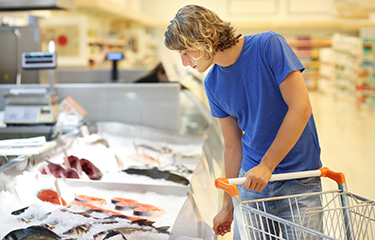The power of transparency when it comes to building lasting relationships with consumers is apparent in the results of the latest Feed4Thought survey conducted by international aquafeed company Cargill.
According to Pilar Cruz, president of Cargill’s aqua-nutrition business, transparency in the supply chain is critical when building consumer trust – a notion reiterated in the new survey’s feedback.
“The results of our recent quarterly Feed4Thought survey underscore what we see in the aqua[feed] industry, which is that consumers want better understanding of the story behind the food they are eating,” Cruz told SeafoodSource. “The key question for aquaculture, is how are we going to deliver on sustainability and the need for transparency?”
Cruz said this is why Cargill works with key stakeholders in the industry identifying and developing sustainable raw materials that can safely be introduced into the value-chain. The company has also been strengthening its processes to mitigate any impacts on the environment, she added.
The survey, which had 3,500 respondents in the U.S., Norway, and the Philippines, looked at current perceptions around the wholesomeness of food, with consumers listing health and well-being, sustainability, and economic vibrancy as important factors.
The results also highlighted how the word “wholesome” has become a catch-all for a variety of things that consumers care about. There was little overall agreement among participants about what wholesome actually means, but in Norway and the Philippines, it was most associated with food being naturally high in beneficial nutrients, Cargill said. A majority of Feed4Thought respondents in the U.S. and Norway believed that a wholesome food should be good for the person eating it, while Filipinos and Gen Z Americans prioritized benefits for the environment. Sustainability was ranked by 77 percent of the survey participants as the top factor in wholesomeness.
“As a general trend, we see consumers prioritizing personal health, food engagement, and community wellness as they consider their protein options, and there are three main areas that influence their purchase behavior when it comes to protein,” said Cruz. “The first influence is diversity, with consumers thinking of protein as a nutrient, and wanting diversity in terms of nutrition and flavor. The second is accessibility, and here, consumers are seeking protein sources that meet their needs more fully, especially in terms of better cost or convenience. The third is health values. Consumers have concerns about animal-based protein sources around issues of animal welfare, antibiotic use and environmental impacts, which they often believe to be intertwined with negative health impacts,” she said.
Cruz said she believes diversity, accessibility, and transparency are also key opportunities for aquaculture.
“Seafood can deliver on diversity of flavor and convenience, and recent shifts in consumer preferences, along with disease issues and shake-ups in the supply chain, bring changes in where protein will come from. Through 2026, seafood consumption is predicted to grow at a rate of 1.7 percent per annum, and due to consumer preference for healthier and more sustainably-sourced protein, seafood will be the largest contributor to growth in animal protein consumption,” Cruz said.
Dave Robb, sustainability manager for Cargill’s aqua-nutrition business, saidthe Feed4Thought survey underscores the importance of the mission of Cargill and the entire seafood industry of not just striving to produce sustainable seafood, but in sharing the story of how it is produced sustainably.
“With the growing interest from consumers in food systems and sustainability, particularly around the impact of food production on climate change, our end goal is to deliver reports and tools that can operate for all species, and in turn, help farmers to tell their own sustainability story,” Robb said.
Cargill convened a value-chain summit at the end of 2019, which included traditional and novel raw material suppliers, farmers, processors, and retailers to discuss what it would take to deliver transformational change in salmon aquaculture through aquafeed. Sustainable raw materials, measurements, reporting, and communication were identified by industry leaders as three key areas of opportunity and collaboration across the value chain.
“We’re focusing on expanding our raw material basket, developing and improving tools that support measurement and reporting, then telling the story," Robb said. "Our 2019 sustainability report will be available at the end of May and outlines all our work in these areas."
Robb said tools such as Cargill’s traceability reports and life-cycle assessment enable fish farmers to have an assessment of the greenhouse gas footprint impacting their feed and fish production. This can be used to provide reassurance to their customers and consumers.
Looking to the future, Cruz sees two main areas of opportunity for aquaculture – the first is digital, and the second is a greater variety of novel ingredients.
“Cargill’s myEWOS platform and SeaCloud database provide accurate analyses and feed recommendations based on data from the production of over 1.5 billion salmon, and are key in developing new green solutions. One example is developing lower carbon footprint feed based on sensor and machine-based optimizations of the supply chain,” she said.
On feed ingredients, Cruz said several novel ingredients are already achieving scales that enable them to be introduced to the salmon feed market.
“Cargill is proactively looking for alternative feed ingredients, as evidenced by recent partnerships with Innova Feed, White Dog Labs, and the introduction of single-cell protein feed ingredients from Calysta and KnipBio,” Cruz said.
Photo courtesy of LADO/Shutterstock







